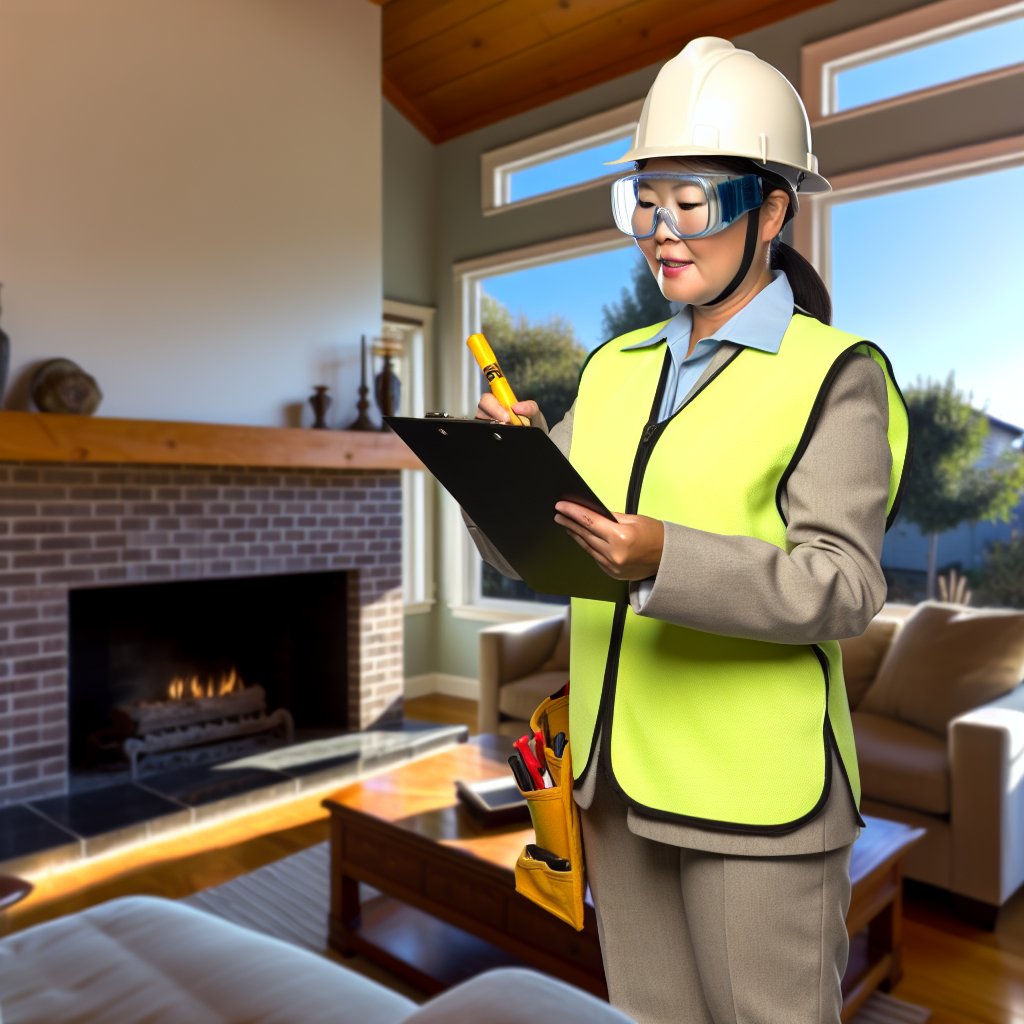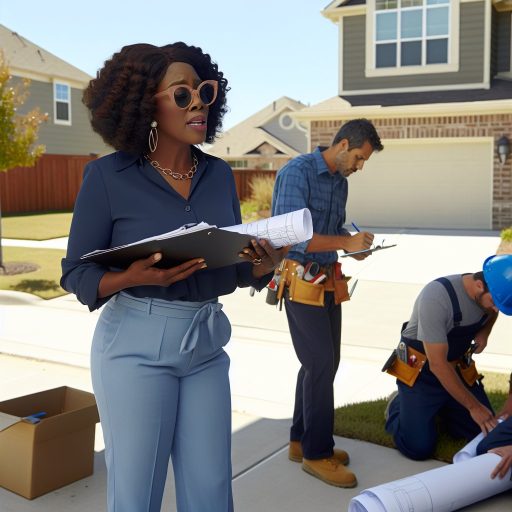Understanding the Importance of Home Inspections for Residential Properties
Home inspections play a crucial role in the real estate process.
They help identify potential issues before a purchase is completed.
Buyers can avoid costly repairs by knowing the property’s condition.
Inspections provide peace of mind and reinforce buyer confidence.
Identifying Hidden Problems
Many issues within a home are not visible at first glance.
A professional inspector uncovers hidden problems such as structural damage.
They locate issues with plumbing, electrical systems, and the roof.
By identifying these problems early, homeowners can plan accordingly.
Negotiating Better Terms
Finding issues during an inspection can strengthen a buyer’s position.
It provides leverage for negotiating repairs or price reductions.
For example, buyers may request that sellers fix significant issues before closing.
This can result in substantial savings for the buyer.
Ensuring Long-term Safety
Home inspections help ensure the property’s safety for residents.
Inspectors examine critical systems that affect safety, such as heating and cooling.
They also assess fire safety systems, like smoke detectors and alarms.
Transform Your Real Estate Decisions
Unlock personalized real estate insights crafted just for you. Get actionable advice designed to amplify your success.
Get StartedA thorough inspection can prevent future emergencies or health risks.
Understanding Future Maintenance Needs
Home inspections provide insight into upcoming maintenance needs.
This helps homeowners budget for necessary repairs in the future.
Additionally, inspectors offer advice on routine maintenance practices.
Knowing what to expect aids homeowners in maintaining their property effectively.
Types of Home Inspections
General Home Inspections
General home inspections offer comprehensive evaluations of residential properties.
These inspections identify potential issues that could affect property value.
A qualified inspector examines major systems like plumbing and electrical.
Homeowners receive a detailed report outlining the inspector’s findings.
This inspection often occurs before buying or selling a home.
Specialty Inspections
Specialty inspections focus on specific concerns within a home.
Examples include roof inspections, pest inspections, and mold assessments.
Roof inspections check for damage or deterioration in roofing materials.
Pest inspections identify issues with insects or rodents.
Showcase Your Real Estate Business
Publish your company profile on our blog for just $200. Gain instant exposure and connect with a dedicated audience of real estate professionals and enthusiasts.
Publish Your ProfileMold inspections check for air quality and visible mold growth.
Pre-Listing Inspections
Pre-listing inspections are conducted before selling a home.
They help homeowners identify problems that could hinder the sale.
This proactive approach allows sellers to address issues in advance.
It often leads to a smoother transaction process.
Buyers appreciate knowing about the home’s condition upfront.
New Construction Inspections
New construction inspections ensure quality and adherence to building codes.
These inspections occur at various stages throughout the construction process.
Inspectors evaluate structural integrity and safety features.
Homeowners can ensure their new home meets their expectations.
This type of inspection provides peace of mind for the new homeowner.
Post-Disaster Inspections
Post-disaster inspections assess damage after events like floods or storms.
These inspections determine if a property is safe for occupancy.
An experienced inspector evaluates structural damage and hazards.
Homeowners receive critical information needed for insurance claims.
Timely inspections can aid in recovery efforts.
Key Components of a Residential Property Inspection
Introduction to Property Inspections
A residential property inspection evaluates the condition of a home.
This process identifies potential issues throughout the property.
Qualified inspectors conduct thorough examinations systematically.
Overall, inspections help homeowners make informed decisions.
Structural Integrity
The foundation supports the entire home, so it needs inspection.
Inspectors look for cracks and settling signs in the foundation.
Additionally, they assess walls for any bulging or bowing.
Common areas inspected include beams, trusses, and floors.
Roof Examination
Roofing materials must be in good condition to prevent leaks.
Inspectors evaluate shingles, flashing, and gutters.
They also check for signs of water damage inside the attic.
Exterior Inspection
The exterior walls should be examined for cracks and decay.
Inspectors assess siding materials for weather-related damage.
Windows and doors also require a thorough check for functionality.
Showcase Your Real Estate Business
Publish your company profile on our blog for just $200. Gain instant exposure and connect with a dedicated audience of real estate professionals and enthusiasts.
Publish Your ProfileSystems and Utilities
The plumbing system is crucial for home functionality.
Inspectors check for leaks, water pressure, and drainage issues.
They examine pipes for signs of corrosion or malfunction.
Electrical Systems
Electric systems undergo scrutiny for safety compliance.
Inspectors check the condition of wiring and circuit breakers.
Additionally, they ensure outlets and fixtures are working properly.
HVAC Assessment
The heating, ventilation, and air conditioning systems are vital.
Inspectors evaluate the efficiency and maintenance of these systems.
They check for signs of wear and ensure proper operation.
Interior Evaluation
The interior of the home should also be thoroughly inspected.
Inspectors look for signs of moisture damage and mold growth.
They assess flooring, walls, and ceilings for any abnormalities.
Safety Features
Safety features are essential in ensuring a secure living environment.
Inspectors check smoke detectors, carbon monoxide detectors, and fire alarms.
They also ensure that exits and escape routes are clear and accessible.
Additional Considerations
Home inspections may include environmental assessments.
Inspectors can test for radon, lead, or asbestos if necessary.
This provides homeowners with a complete overview of potential hazards.
Ultimately, these inspections lead to safer homeownership experiences.
Delve into the Subject: How to Build a Brand for Your Rental Property Business Online
Preparing Your Home for an Inspection: Tips for Homeowners
Understanding the Inspection Process
Start by understanding what the inspection entails.
An inspection assesses your home’s condition thoroughly.
It covers the roof, foundation, plumbing, and electrical systems.
Knowing this can help you prepare more effectively.
Conducting a Pre-Inspection
Perform your own inspection before the official one.
Walk through each room to check for obvious issues.
Look for water stains, cracks, and signs of pests.
Fix minor issues to present a well-maintained home.
Clearing the Clutter
Declutter your home before the inspector arrives.
This allows for better access to critical areas.
Showcase Your Real Estate Business
Publish your company profile on our blog for just $200. Gain instant exposure and connect with a dedicated audience of real estate professionals and enthusiasts.
Publish Your ProfileClear paths in attics, basements, and garages.
A tidy home presents a positive impression.
Preparing Exterior Areas
Don’t forget about the exterior of your home.
Make sure the yard is well-maintained and tidy.
Trim overgrown bushes and mow the lawn.
Ensure that pathways and driveways are clear.
Documenting Repairs and Upgrades
Gather documentation for any repairs or upgrades.
List recent maintenance work, receipts, and warranties.
This showcases your commitment to home upkeep.
An organized file helps build trust with the inspector.
Ensuring Utilities Are Functional
Make sure all utilities are operational before the inspection.
Test your HVAC system, plumbing, and electrical fixtures.
Address any concerns or malfunctions before they arise.
This step is crucial for a smooth inspection process.
Communicating with the Inspector
Be ready to communicate openly with the inspector.
Provide any prior inspection reports or notes.
This aids the inspector in understanding the property’s history.
Share details about any ongoing issues or repairs.
Staying Calm and Flexible
Finally, keep a calm and flexible attitude.
Inspections can sometimes reveal surprising findings.
Be open to discussing issues and recommendations.
This willingness can facilitate a smoother process.
Explore Further: Best Practices for Creating Engaging Rental Property Video Ads
Choosing the Right Home Inspector
Understanding Qualifications
Qualifications matter when selecting a home inspector.
Inspectors should hold a valid license in their state.
Look for certifications from reputable organizations.
Common organizations include the International Association of Home Inspectors and the American Society of Home Inspectors.
Experience plays a crucial role in inspection quality.
Ideally, choose inspectors with several years in the industry.
They should have a background in construction or engineering.
Showcase Your Real Estate Business
Publish your company profile on our blog for just $200. Gain instant exposure and connect with a dedicated audience of real estate professionals and enthusiasts.
Publish Your ProfileCheck their references and past client reviews.
A strong track record indicates reliability and professionalism.
Evaluating Experience
Experience directly impacts an inspector’s ability to find issues.
Ask how many inspections the inspector has completed.
Inspectors familiar with your home’s age and style are preferable.
Inquire about their experience with similar properties.
Knowledge of local building codes is also essential.
Moreover, seasoned inspectors can identify potential future problems.
Their insights can save you from costly repairs later on.
Asking the Right Questions
Prepare a list of questions to ask potential inspectors.
Inquire about their inspection process and tools used.
Ask how they report findings and what details are included.
Ensure they will provide a written report after the inspection.
Discuss availability and how promptly they can schedule appointments.
Confirm if they have liability insurance for additional protection.
Comparing Costs
Cost should be one of several factors in your choice.
Obtain quotes from multiple inspectors to compare prices.
Be wary of prices that seem too low; they may indicate poor quality.
Understand what is included in the cost to avoid surprises.
Verify if additional fees apply for certain services.
Make sure the inspector offers value in terms of expertise and service quality.
Reading Reviews and Testimonials
Online reviews can provide insights into an inspector’s reputation.
Check websites like Yelp and Angie’s List for ratings.
Ask friends or family for recommendations if possible.
Personal experiences can guide you towards trustworthy inspectors.
Contact former clients to understand their satisfaction level.
Inquire if the inspector effectively communicated findings.
Making Your Final Decision
After gathering information, review all data carefully.
Select a home inspector who meets your qualifications and budget.
Ensure you feel comfortable communicating with them.
Showcase Your Real Estate Business
Publish your company profile on our blog for just $200. Gain instant exposure and connect with a dedicated audience of real estate professionals and enthusiasts.
Publish Your ProfileYour inspector will play a vital role in your home-buying journey.
A thorough inspection will provide peace of mind.
Ultimately, choose the inspector who offers the best combination of expertise and communication.
You Might Also Like: Essential DIY Repairs Every Landlord Should Know
Interpreting the Inspection Report: Common Findings Explained
Inspection reports are crucial documents for homeowners.
They provide valuable insights into the property’s condition.
Understanding these reports can empower informed decisions.
Structural Issues
Structural issues are common in many homes.
Foundation cracks often indicate potential problems.
Inspectors may highlight sagging beams or walls.
These findings warrant further assessment by specialists.
Common Structural Concerns
- Foundation movement or settling.
- Uneven or sloping floors.
- Visible cracks in walls or ceilings.
Electrical Systems
Electrical systems are essential for safety and functionality.
Inspectors assess wiring, outlets, and the overall system.
Outdated or damaged systems can pose serious risks.
Typical Electrical Findings
- Exposed or frayed wiring.
- Inadequate grounding and bonding.
- Overloaded circuits without safety measures.
Plumbing Issues
Plumbing issues can lead to costly repairs over time.
Inspectors check for leaks, pipe corrosion, and water pressure.
These investigations ensure the plumbing system is sound.
Frequent Plumbing Problems
- Leaking faucets or toilets.
- Rusty or corroded pipes.
- Low water pressure in fixtures.
HVAC Systems
Heating, ventilation, and air conditioning systems are critical.
Inspectors evaluate their functionality and efficiency.
Regular maintenance is necessary to ensure longevity.
Common HVAC Concerns
- Dirty or clogged filters.
- Inadequate heating or cooling output.
- Leaking refrigerant lines.
Roof Condition
The roof is vital for protecting the home from elements.
Inspectors survey for missing shingles or leaks.
Maintaining a sound roof is essential for longevity.
Roofing Issues to Watch For
- Missing or damaged shingles.
- Granule loss on shingles.
- Signs of leaking in the attic.
Understanding the inspection report is fundamental for homeowners.
Identifying common findings helps in making informed decisions.
Addressing these issues proactively can save time and money.
Discover More: Lease Agreements for Section 8 Tenants

How to Address Issues Discovered During Inspection
Identify the Issues
Start by thoroughly reviewing the inspector’s report.
List all the issues noted in the report for clarity.
Prioritize these issues based on their severity and potential impact.
Showcase Your Real Estate Business
Publish your company profile on our blog for just $200. Gain instant exposure and connect with a dedicated audience of real estate professionals and enthusiasts.
Publish Your ProfileResearch Solutions
Investigate common remedies for the identified problems.
Consult reputable online resources for guidance.
Consider reaching out to local professionals for expert advice.
Consult Professionals
Engage qualified contractors or specialists for serious issues.
Request estimates from multiple professionals to compare costs.
Always check references and reviews for reliability.
Negotiate Repairs with Sellers
If you are in the process of purchasing the home, discuss issues with the seller.
Request repairs or credits based on the inspection findings.
Be transparent about your expectations to foster cooperation.
Plan for Repairs
Once you’ve identified the necessary repairs, create a timeline.
Schedule repairs based on urgency and availability of contractors.
Ensure the chosen contractors are licensed and insured before starting.
Perform Regular Maintenance
Maintain your home to prevent future issues from arising.
Develop a routine inspection schedule for key systems and components.
Address minor repairs promptly to avoid escalation.
The Role of Inspections in Buying and Selling Real Estate
Importance of Home Inspections
Home inspections play a critical role in real estate transactions.
They provide valuable information about a property’s condition.
Inspections help buyers make informed decisions.
Additionally, sellers can address issues before listing their homes.
For Buyers: Assessing Property Condition
Buyers rely on inspections to identify potential problems.
These problems can range from minor repairs to major structural issues.
Through inspections, buyers gain peace of mind before their purchase.
Moreover, they can negotiate repairs with the seller based on findings.
For Sellers: Enhancing Marketability
Sellers benefit from conducting pre-listing inspections.
This proactive approach allows them to fix issues in advance.
Consequently, a well-maintained property attracts more buyers.
Furthermore, it can lead to a smoother negotiation process.
Importance of Professional Inspectors
Hiring a qualified inspector can make a significant difference.
Professional inspectors bring expertise and experience to the table.
They provide comprehensive reports detailing their findings.
Showcase Your Real Estate Business
Publish your company profile on our blog for just $200. Gain instant exposure and connect with a dedicated audience of real estate professionals and enthusiasts.
Publish Your ProfileAdditionally, they can help educate buyers and sellers during the process.
Common Inspection Findings
Home inspections often reveal common issues across properties.
- Roof damage or leaks
- Pest infestations
- Mold or water damage
- Electrical system issues
- Plumbing concerns
Addressing these issues early can enhance property value.
It can also prevent costly repairs in the future.
Benefits of Inspections in Real Estate Transactions
Inspections provide peace of mind for all parties involved.
They foster transparency and trust in real estate transactions.
As a result, everyone benefits from informed decisions.
Post-Inspection: Next Steps for Homeowners
Understanding the Inspection Report
The inspection report contains valuable information about your property.
Review each section carefully to absorb all details.
Pay attention to noted issues and recommendations from the inspector.
Highlight areas that require immediate attention or further evaluation.
Prioritizing Repairs
Organize repairs based on urgency and importance.
Start with safety concerns such as electrical or structural issues.
Next, address systems that impact daily living, like plumbing and HVAC.
Finally, plan for cosmetic upgrades and improvements.
Consulting Professionals
Consider hiring specialists for complex issues noted in the report.
For example, a licensed electrician can assess electrical concerns.
Similarly, a plumber should evaluate plumbing problems.
Gather multiple quotes to compare services and costs.
Negotiating with Sellers
If you are in a buying situation, use the report to negotiate repairs.
Discuss findings with the seller to find a resolution.
You might request repairs or a price reduction based on inspection findings.
Maintain clear communication throughout the negotiation process.
Documenting Repairs
Keep detailed records of all repairs undertaken.
Documenting helps maintain your property and may aid future sales.
Take before-and-after photos to visually represent improvements.
Store all receipts and warranties in a dedicated file.
Maintaining Your Home
Make a plan for regular home maintenance checks moving forward.
Schedule periodic inspections to catch potential issues early.
Consider season-specific tasks like gutter cleaning and HVAC servicing.
Showcase Your Real Estate Business
Publish your company profile on our blog for just $200. Gain instant exposure and connect with a dedicated audience of real estate professionals and enthusiasts.
Publish Your ProfileStaying proactive helps protect your investment long-term.
Frequently Asked Questions About Residential Property Inspections
What Is a Residential Property Inspection?
A residential property inspection evaluates a home’s condition.
It provides potential buyers with important information.
This process helps identify any significant issues in the property.
Why Do I Need a Property Inspection?
Property inspections help buyers understand what they are purchasing.
They reveal hidden defects that could lead to costly repairs.
Additionally, inspections offer peace of mind while making a purchase.
When Should I Schedule an Inspection?
Schedule an inspection after making an offer on a home.
This allows you to gather information before finalizing the sale.
It’s wise to conduct inspections promptly to avoid losing the opportunity.
How Long Does an Inspection Take?
Most residential property inspections last between two to three hours.
This timeframe allows for a thorough evaluation of the property.
The inspector will assess both the interior and exterior areas.
What Do Inspectors Look For?
Inspectors check for structural integrity and safety hazards.
Common areas of focus include roofing, plumbing, and electrical systems.
They also examine HVAC systems, foundations, and attics.
How Much Does a Home Inspection Cost?
The cost of home inspections varies depending on location and property size.
Generally, expect prices to fall between $300 to $500.
Keep in mind that this investment can save money in the long run.
What Should I Do With the Inspection Report?
Review the inspection report carefully after receiving it.
Prioritize any significant issues that require immediate attention.
Use this information to negotiate repairs with the seller.
Can I Attend the Inspection?
Yes, most inspectors encourage homeowners to be present.
Being onsite allows you to ask questions and learn more.
This interaction helps clarify any concerns that arise during the inspection.
What If Issues Are Found?
Discuss the findings with your real estate agent.
You may negotiate repairs or adjustments to the sale price.
Sometimes, buyers can request repairs be completed before closing.
Are All Inspections the Same?
No, inspections can vary based on the type of property.
Specialty inspections, like pest or lead inspections, may be needed.
Showcase Your Real Estate Business
Publish your company profile on our blog for just $200. Gain instant exposure and connect with a dedicated audience of real estate professionals and enthusiasts.
Publish Your ProfileAlways ask the inspector about their specific approach and tools used.




